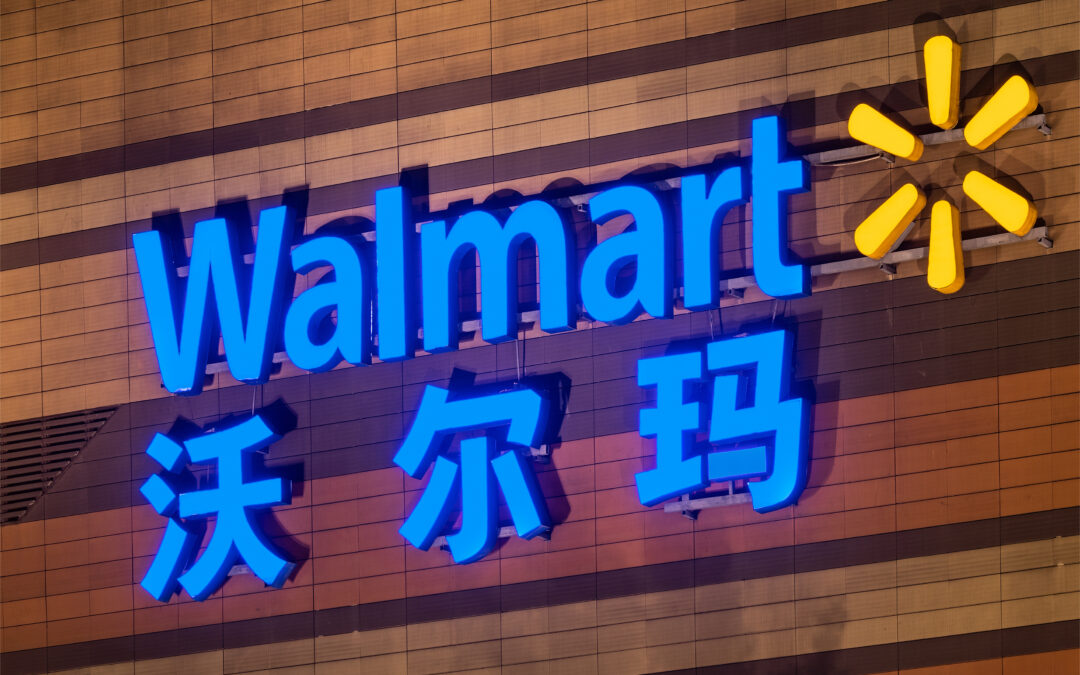The latest volley in Trump’s ongoing trade war has come from none other than mega-retailer Walmart — who’s now warning that they’ll be forced to raise prices to account for new tariffs.
Trump’s response was simple, instructing Walmart to “eat the tariffs” instead.
That’s a surprising pivot for one of the most pro-business presidents in American history.
But in reality, this conflict is about much more than any individual American business (however large it may be). Watch this week’s video below for the full story:
Video transcript:
Welcome to Moneyball Economics. I’m Andrew Zatlin, and well, it finally happened…
Walmart announced that they are going to be raising prices because of tariffs, and Donald Trump just as quickly responded and said to Walmart, “don’t raise prices, just absorbed the higher costs.”
So Donald Trump is basically fighting the tide here. He’s trying to get his cake and eat it. Two, raising tariffs to reshape the American and global economies, but at the same time, trying to prevent the inevitable higher costs of imports trickling down into higher consumer prices.
Is he going to be successful? Well, let’s talk about that.
Right now, we’re in an eye of the hurricane situation. What I mean by that is we’ve just started the second month of the tariff regime, but most companies out there in anticipation of the tariffs front ran it. That means they built up a two, three, or even four month stockpile of stuff.
But like I said, we’re now in the second month, and so Walmart is sitting there saying, look, I’ve got another month or two of supplies that I’ve stockpiled that will carry me forward for a little bit. So I’m still able to sell using the pre tariff costs, but once I get into June and July, I’m now having to sell stuff that came in in the post tariff regime. That’s a higher cost, and I’m going to pass that along to my customers. And so that is why we’re in eye of the hurricane.
Most companies have not yet gotten to that point, but they’re coming close to it. We’re not just talking about any old retailer here. We’re talking Walmart. They represent 6% of all retail sales in the United States. If they raise prices, that is an immediate push upwards in consumer inflation, and that’s exactly what Donald Trump wants to avoid.
It goes beyond just Walmart as a retailer or as the retailer. Because once they go forward, they provide political cover for all other retailers to do the same thing. So you’ve got Donald Trump just fighting the tide, and God bless him. Good luck to you.
Walmart, though is actually an interesting beast, and we should take a step back and understand their role in the US economy over the past 25 years. Because what Donald Trump is doing is he’s not just trying to reshape small things. He’s literally trying to change the way the internet has affected the global economy. This is a gargantuan task and we’ll have to wait a long time to find out if he’s successful in the near term, it’s really going to manifest itself as inflation, yes or no.
Now, when I say he’s fighting the internet, let me explain…
Right now, we’ve got inflation worries. Oh, is it 2%? It’s above 2%. Oh my God, it’s a crisis. Clutch the pearls. But did you know that prior to the internet, inflation of 4% and 5% was pretty much the norm, that it was expected sometimes even as high as 10%, and yet for almost 30 years, we’ve seen inflation around 2-3%.
What’s going on? What happened that the internet did that? Well, what happened was with the internet, a couple of things happened. First of all, you suddenly had alternative sources. You could suddenly buy a lot of stuff around the world and companies didn’t have to stockpile as much.
If you look at business inventories to sales, how much a company keeps on hand relative to their expected sales, what you see is this massive downward slope. What’s happening is businesses were able to maintain less inventory, less supply on the shelves. Why?
Well, because if they needed something, they could go on the internet and they could find around the world where that stuff was, and they had pricing and availability, they could immediately say, I can get this and it will come to me on time and at a price that I like. It created massive competition and at the same time, hey, it opened up their capital. They didn’t have to be locked in.
This is why starting in the 90s, our economy just surged thanks to the internet. However, a couple of other things that go along with that, yes, the internet means anybody around the world can suddenly go to a marketplace, but it was the emergence of China in 2000, 2001 when they joined the World Trade Organization that really pushed this into overdrive because they became the supplier of choice. And once you look at China’s growth starting in 2000, 2001, it’s breathtaking.
They went from being a bit player on the world stage to being a major player on the world stage. Walmart played a role in this. When you look at China’s exports to the US and you look at Walmart sales, it’s uncannily about the same pace because what happened was at the same time that China suddenly became a supplier, Walmart became a purchaser.
That’s right.
Walmart starting at the same time, saw their sales rocket up because they basically are just a subsidiary of China at this point. That is another reason why Trump is pushing back on Walmart. It’s basically sending a message to China. They’re saying to Walmart and China, you can do whatever you want, but don’t raise prices on the American consumer. So Walmart, we want you to push back on China. Whatever’s going on, it’s their problem.
What China has done has essentially been critical to the US economy in the past 25 years.
We have a low inflation because in effect, China’s been exporting deflation by being that low-cost supplier of choice and being a rival and a competitor to other suppliers. We have seen cost inflation very low, a very long period actually, of deflation as, like I said, you didn’t have to type as much capital into stockpiles on your shelves, so demand went down a lot.
At the same time, you’ve got this new emerging factory supply from China net. Thanks to China, the US has gone through almost three decades of very mild inflation, and now Trump is effectively pulling that rug out. He’s saying, as a source, as a competitive source of supply, we want to remove China. And so the inevitable is, well, in that case, you’re undoing a lot of the benefits of the internet, which were to bring prices down to create global competition in the supply chain.
There is, it’s really hard to imagine, but there is really no way around the fact that when you remove a major source of deflation, you are going to enable inflation.
This is a challenge for Donald Trump. We’re barely one month into this, and already we’re starting to see some preliminary signs of retailers saying, look, I’m seeing higher costs. I’m not going to absorb it. I’m not going to take the margin hit. So the next question is, the next shoe to drop. What is Donald Trump going to do when all of these companies start ganging up on him and say, look, we got to do this?
And remember, Walmart met with Donald Trump a couple of weeks ago. They had a conversation. I guarantee you they spoke about this, the inevitability of inflation. If Donald Trump didn’t find a tariff solution and find it quickly, now I think Donald Trump is going to lay off the tariffs somewhat and possibly more over time.
But I also think when it comes to China, he’s not going to lay off the tariffs. And so as a result, I think we are going to see a little bit of inflation going downstream, unless Trump somehow comes up, finds an executive order that says All importers have to absorb these higher costs, and that’s not going to happen.
My take is that Walmart and Amazon clothing stores, you name it, retailers are going to be under the microscope. They’re going to be pushed hard to absorb costs, which means they’re going to take a margin hit. This is going to be a very interesting battle that’s being fought, and I don’t know where it’s going to go, but I will say that a lot of retailers are going to be very exposed and I wouldn’t be investing in them.
Right now we’re in it to win it, folks.
Zatlin out.

Andrew Zatlin
Editor, Moneyball Economics





